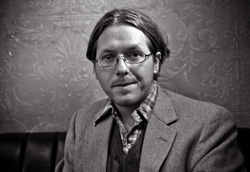

By Jay Fox
Brooklyn, NY, USA

Jay Fox
The 1950s produced some of the best fiction in the history of America. More than being the decade of the Beats, as well as the twilight of the careers of Hemingway, Faulkner and, though he would live another fifty years, Salinger, it also saw the publication of arguably the two best English language novels of the mid-twentieth century: Vladimir Nabokov's Lolita and Ralph Waldo Ellison's Invisible Man. For reasons beyond me, it seems as though most Americans only read the latter book during high school. The former, meanwhile, is a work that one usually reads both in the college classroom and then revisits later as an adult.
This is a tragedy. For all of Nabokov's lyricism and subtle manipulation, Lolita lacks a political dimension. Furthermore, Humbert Humbert, the protagonist in the book, can only be relatable to his audience with great effort and more than just a few white lies. This is far cry from the effortless prose of Ellison and his narrator's ostensible honesty as he details the long, brutal process of having one's naivety torn away from them. He is extremely relatable. Furthermore, the trajectory of Ellison's unnamed protagonist in Invisible Man, from his time as a star student to his time as a disillusioned young man making his notes from the underground, has a universal appeal to American intellectuals of all walks of life, especially those of us who are both relatively young and finding it increasingly difficult to have faith in political movements due to the madness of 2016. If you haven't read this book since your AP English class in high school, you're doing yourself a disservice. It isn't a coming-of-age novel like Catcher in the Rye, nor is it a book entirely focused upon the complexities of race in America. It is a modernist masterpiece of seemingly limitless intellectual depth that explores issues of a far more universal nature.
If you haven't read it at all, you are doing an even greater disservice. However, if this is the case, allow me to fill you in. The story follows a black narrator who was born in the Deep South during the age of segregation, lynchings and Jim Crow. He is a gifted orator, as well as an exceptional and ambitious student, and is crowned the valedictorian of his high school. After reciting his speech at his graduation, he is asked by the town's leading men to come to a party to once again give his speech. Before he can speak, however, he is blindfolded and forced to participate in a battle royal with several other young, black men from the area. After suffering this humiliation, he gives his speech, which the leading men ignore or fail to understand. Despite such an indignity, they award the protagonist with a scholarship to an all-black college.
He excels academically at the school, and eventually finds himself serving as the tour guide for several of the school's white, liberal benefactors who hail from the Northeast. After showing one of them around an area adjacent to the campus, one which happens to be off-limits for benefactors of the college as it is a reminder of just how non-respectable some parts of the black community still happen to be, he is effectively expelled from the college. He leaves for Harlem with a few belongings and a few sealed letters of introduction from Dr. Bledsoe, the president of the college, who ostensibly wants to help the protagonist settle in the big city. Eventually, he finds that these letters of introduction are not meant to help him get a job. They are meant to discourage potential employers from hiring him.

The protagonist's time in New York is far from easy. He has a very hard time finding work or people with whom he can relate until an opportunity presents itself not long after he begins his first northern winter. Upon seeing an old couple being evicted from their home, he rouses a small group to action with his golden tongue. In the aftermath, the protagonist is approached by a radical by the name of Brother Jack, who asks him to join a political organization known as the Brotherhood, which is a thinly veiled reference to an arm of the Communist Party, and to help them organize Harlem.
As the novel progresses, however, the narrator comes to see that he is really just being used by the organization to advance their own aims, and that they care about neither brotherhood, the protagonist nor the black community. It's not that the Brotherhood is evil. Instead, the leaders are the rigid types of theoretician Marxist-Leninists that one rarely, if ever, encounters anymore. They are blind to the individual needs of others because their concerns lay solely with the constituency of the universal proletariat (who Badiou might refer to the "legendary defeated") or with aiding the advance of historical necessity. Like seemingly all people with whom the narrator interacts, the senior members of the Brotherhood are incapable of recognizing or appreciating his humanity in its entirety.
I would like to stress that the purpose of the book is not to vilify communism or communists, nor was it influenced by the idiocy of Objectivism as Invisible Man predated both the Second Red Scare and the cult of Ayn Rand. It's not even meant to detail the reasons why so many within the black community distrust white progressive movements that seem far too eager to offer a seat at the table to a token black person, but are quick to relegate many of the most dire issues facing the black community to the back burner. The ultimate betrayal of the Brotherhood should not be read as an indictment of all such movements, but rather the ones that find omelets acceptable so long as they are made from black eggs. For while the betrayal is central to the trajectory of the story arc, and contains within it its own lesson, it is less important to the philosophical buttress that makes Invisible Man so much more than merely another tale about racism or youthful ambition being frustrated by the weathered, but deceptively resilient edifice of entrenched power.
This philosophical buttress is where Ellison's full genius comes into full view. As the novel comes to close, we begin to realize that the protagonist is always seen as a collage of various social identifiers that are loaded with historical meaning, but are typically reduced down to a few stereotypes. These identifiers effectively wallpaper an individual. What lies beneath this proverbial covering is considered irrelevant or invisible.
Apropos of what Sartre called bad faith (the act by a subject of assuming the role of a socially constructed identity, be it a waiter who acts too much like a waiter, such as Jennifer Aniston's co-worker at Chotchkie's in Office Space, or a person who takes on an affectation in order to more easily identify as a member of a social group), the narrator is both incorrectly defined by roles that are the mere projections of others and expected to assume these roles. Contrary to Sartre's assertion that existence precedes essence, those who surround the narrator expect his existence to conform to expectation—to a prefabricated essence. At times it is for their own amusement or pleasure, such as when Sybil, the wife of a party bigwig, expects him to fulfill her rape fantasy. Other times it is comes down to the fact that people can't appreciate the core of his humanity (as this is invisible), but rather only see what they want to see of him.
Such blindness is not a solely white malady. The black characters are affected by it, too. This is most apparent when the protagonist dons a hat and a pair of shades toward the end of the novel and begins to walk through Harlem. Even people who once called him brother mistake him for a preacher-pimp named Rinehart.
This is not a phenomenon that is unique to black Americans, nor is it an issue with which only the marginalized must deal. As Ellison wrote in the introduction to the novel, he felt his task was "one of revealing the human universals hidden within the plight of one who was both black and American." This type of invisibility is universal.
While what I took away from Ellison's masterpiece may borrow too heavily from the early work of Sartre, Simone de Beauvoir and Erich Fromm, the author certainly sought to illustrate how identifying a person by one or many social roles robs them of their individuality. More importantly, Ellison demonstrates how others play the part of Dr. Frankenstein when they construct identities from familiar social roles, and wind up with less a monster than a manqué man. If we rely too heavily on these roles to inform us how to behave or what to expect from others, eventually we come to see others as nothing more than interchangeable cogs that are used to fulfill the various duties that these roles demand. Their essential humanity and being become invisible.
This is a vital point to remember, especially given the rapid changes that are taking place in 21st century America. The growing importance of algorithms in manipulating how we experience daily life, particularly what we experience while on the internet, has created a new type of dehumanization. Rather than being defined by social roles or social constructs, this era of capitalism has turned each individual into a nexus of preferences and shallow identifiers that are, to be fair, based less on racial, socioeconomic or ethnic stereotypes and more on our previous purchases and searches. However, they still seem to ignore or fail to see what really makes us human. It seems, rather ironically, the more we are monitored and the more we are subjected to data mining, the more invisible we become.
Link:
Jay Fox at Stay Thirsty Publishing





